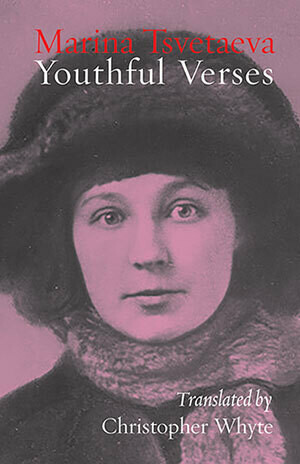Youthful Verses
Marina Tsvetaeva, trans. Christopher Whyte,
(Shearsman Books, 2020); pbk, £10.95
A poet dazzling enough to be commemorated with a minor planet and a ship in her honour, Marina Tsvetaeva is a crown jewel in Russian literature. Christopher Whyte’s translation of her early poems from 1913 to 1915 does an admirable job of bringing her legacy into the twenty-first century.
Whyte shares specifics of Tsvetaeva’s remarkable biography in the introduction which should not be hurriedly skimmed over in order to get to the poetic ‘meat’. She has been characterised as a lyrical diarist, and the introduction explains both the tangled web of personal references (many of these poems are devoted to and about the different relationships in her life), as well as provides details of key events that testify to the tenacity of her spirit.
The poems in this collection fall after her first two autobiographical works, ‘Evening Album’ and ‘The Magic Lantern’, but before her post-revolution works and are centred in a time when she is safe from the political turmoil but scorched by love’s flames and alight privately (‘How those two suns – can conscience free me? – / How those two suns scorched me madly!’). Her life had always been complicated, even before the upheaval she would come to face as a result of the 1917 revolution. As a young woman, she wrote in her diary: ‘With a mother like her, I have no choice – than to be a poet.’
According to Christopher Whyte, there is a shift in Tsvetaeva’s work after the poem ‘With a woman’, he describes the previous works as being of a mixed quality. However, her intertextual inclusions – she quotes and refers to Pushkin, Byron, and Shakespeare throughout – contribute to the overarching charm of these early poems. These references indicate that she is a poet enamoured with the dramatics: the stimulating delights and fancies of her theatrical predecessors. The way she colours emotions and instances with metaphors demonstrates her own flair for the dramatic:
in a haze incense made bluer,
the panels glittered silver[.]
Some readers may find her work like an overpowering perfume, while others will find her unabashed and bold verse sensual and intoxicating. The first lines of a 1913 untitled memento mori poem are:
These lines are dedicated to
whoever’s going to make
the coffin where my forehead, high
and hateful, will lie bared.
The majority of these poems are romantic in nature and through attentive critical analysis and Tsvetaeva’s biography, interesting observations on Tsvetaeva’s (rather modern) views on love and gender can be made. In her diary in 1913, she wrote:
Men and women are not equally akin to me, but equally alien. It’s as easy for me to say “you women” as “you men.” When I say “we women”, there’s always an element of exaggeration, I’m entertaining myself, playing.
And there are plenty of examples of this gendered exaggeration, such as the first lines of ‘S.E.’:
wearing his ring’s like throwing down a gauntlet,
If I’m his wife, it’s for eternity [.]
These metaphors conjure a romantic aggression; it is clear this is poetry free from ambivalence.
If her work is read as feminine, then it is read in the same sense that Lady Macbeth is read as feminine, and similarly, she often operates within a lexicon of revenge, rivalry and antagonism as in the second section of ‘With a Woman’:
Who was the hunter? Who was the prey?
It’s devilishly back to front!
How much did the Siberian cat,
that kept on purring, understand?
There may be an argument about these poems being underdeveloped compared to Tsevtaeva’s later works but it is worth referring back to the collection’s title: these are youthful verses. And they still ring clear with excellence, irony and originality. They create a snapshot in time, giving insight into Russian aristocracy, female liberation, gender expression, and an intense, deep love for the craft.
Cheryl McGregor


Leave a Reply